Buddha’s Birthday in South Korea // The Complete 2025 Guide
Buddha’s Birthday in South Korea – Everything you need to know
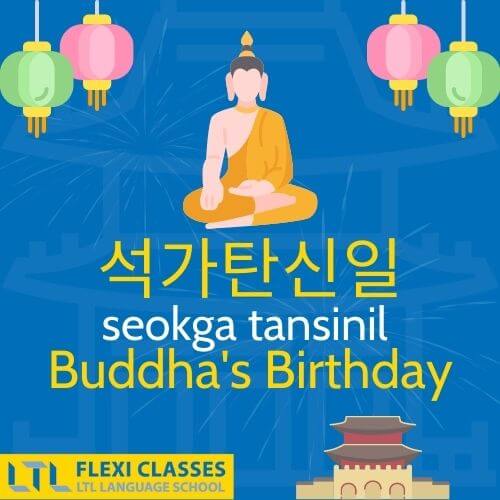
What do people do during Buddha’s Birthday in South Korea? In this article we’ll reveal all.
Korea commemorates Buddha’s birthday or 석가탄신일 [seokga tansinil] in Korean as a national holiday.
This holiday is celebrated on the lunar calendar, so its date is different each year. Most of the time it’s held in May.
It is one of the most important religious events in the Lunar calendar.
In this article, you’ll find how people celebrate Buddha’s Birthday in South Korea, as well as the history of this holiday and a useful vocabulary list to learn the most important words.
First though, here are the key dates up to 2025.
Buddha’s Birthday in South Korea:
May 5th 2025
May 8th 2026
May 13th 2027
Want to know more about Korean holidays? Check out our dedicated page for all Korean national holidays.
Buddha’s Birthday in South Korea | History
Buddha’s Birthday in South Korea | Events for Buddha’s Birthday
Buddha’s Birthday in South Korea | When is Buddha’s Birthday?
Buddha’s Birthday in South Korea | A Complete Vocab List
Buddha’s Birthday in South Korea | FAQ’s
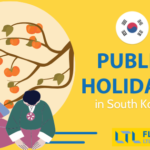
An Introduction to Public Holidays in South Korea
There are 11 public holidays in South Korea. Chuseok, Seollal, Children’s Day… Find out what these days are all about and celebrate with friends.
Want to learn Korean?
We offer online Korean language courses for learners of any level, in both group classes and one-on-one sessions. We now offer Korean courses in Seoul too!
Let’s now turn our focus back to the topic at hand and learn about Buddha’s Birthday in South Korea in more detail!
History
History of Buddhism
After Christianity and Islam, Buddhism is probably the third largest religion in the world.
The founder of Buddhism is Buddha Siddharta Gautama.
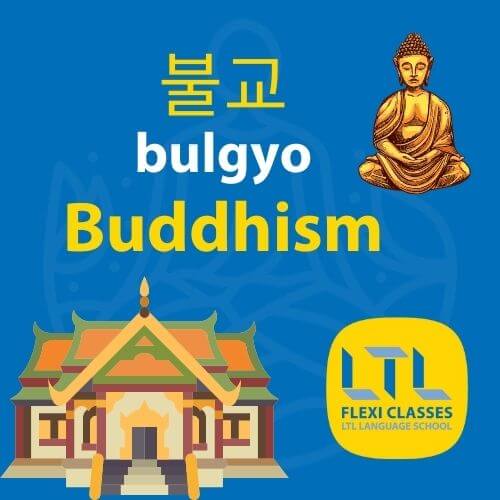
Prince of a small Indian kingdom, he lives in opulence due to his rank without having contact with either the outside of the palace, or with poverty, misery, or death.
It is only after furtive outings that he realizes what misery is.
From then on, he undertook a quest to understand the origin of misery in order to eradicate it.
During his awakening, he realized that man causes his own suffering by undertaking and carrying out negative actions.
Afterward, he convinces many people to adhere to his philosophy, so that at his death, it already has many followers: Buddhism was born.
The Buddha died around 4803 BC. Shortly after the Buddha’s death, the first council of Buddhism was founded by his first disciples: Ananda, Upali and Mahakashyapa.
At that time, his precious teachings survived by word of mouth. It was not until the expansion of Buddhism in Sri Lanka that the Buddha’s precepts were put down in writing.
The arrival of Buddhism in South Korea
The word Buddhism in Korean is 불교 (bulgyo). Buddhism spread very rapidly from 372 to 668, during the so-called Three Kingdoms period.
From the very beginning, Korean Buddhism sort of “absorbed” the already well-established shamanism in the territory, integrating its three deities into its own pantheon.
Subsequently, Buddhism was strengthened by becoming the main religion during the Goryeo period (918-1392).
This period of prosperity allowed the writing of the Tripitaka Koreana, a collection of sacred texts whose printing plates are now preserved in the Haeinsa temple near Daegu.
Many schools were created during the Silla period, and even more during the Unified Silla (668-935). Beautiful temples were built too!
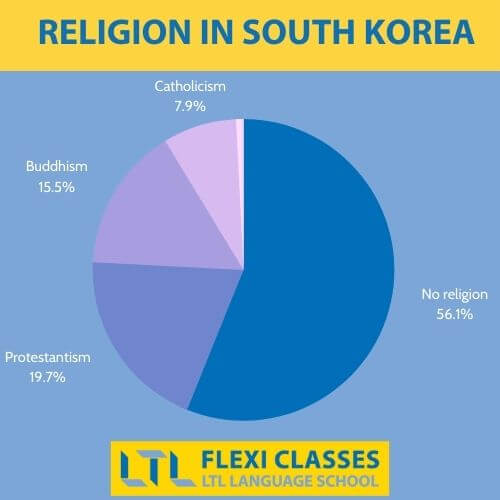
However, despite its strength, and probably because of the corruption of its elites, Korean Buddhism was strongly repressed under the Joseon dynasty (1392-1910). The rulers of the time preferred to favour Confucianism.
Buddha’s birthday has been a public holiday in South Korea since 1975
Today, Buddhism is one of the major religions in South Korea, with around a quarter of the Korean population identifying with it.
As you can see on the diagram, if we don’t count the people who don’t practice any religion, almost a quarter of the Koreans are Buddhist.
Events for Buddha’s Birthday
Buddha’s Birthday is a public holiday 공휴일 (gonghyuil), so Korean people have a day off to celebrate this day.
In Korea, most Buddha’s Birthday events are held during the week (sometimes the month) leading up to Buddha’s birthday, rather than on the day itself.
There are many things to do during Buddha’s Birthday, like visiting temples, eating free food and seeing the lotus lantern festival.
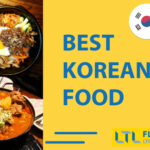
The Best Korean Food 🇰🇷 The Top 10 Korean Dishes for New Eaters to Try Out
There’s LOTS of various dishes in the Korean gastronomy. It might be hard to know what to try out first, so we selected the best Korean food for you to try.
Buddhist Temples in South Korea
Many Buddhist temples host events such as festivals, prayers, traditional games and celebrations, in which anyone is welcome to join.
Some temples also offer a “temple stay“, meaning staying in a temple in Korea. You can spend the night there, or choose a few days’ retreat (kind of like an LTL Homestay)!
In any case, you will have to follow a pre-established program: follow the monastic life which imposes to get up early and go to bed late, and occupy your days with meditations and walks.
Now let’s give a quick presentation of 3 Buddhist temples in South Korea.
Bongeunsa Temple in Seoul [봉은사]
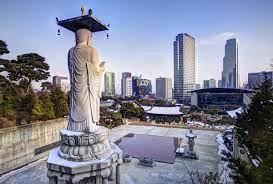
Buried between the many modern buildings of Seoul, Bongeusa Temple is one of the quietest places there.
The construction of Bongeunsa Temple dates back to 794.
This year that corresponds to the reign of King Gyeonseongsa.
It is one of the birthplaces of Buddhism in South Korea.
Samgwangsa Temple in Busan [삼광사]
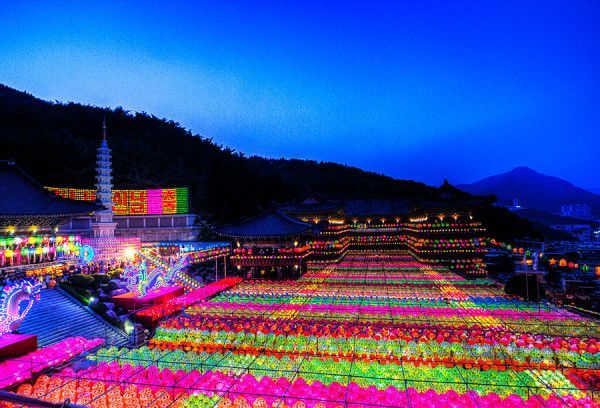
Samgwangsa Temple is a Buddhist temple located in Busan.
At this temple, you can learn about Buddhist ways of worship and see the temples from the inside.
The temple was established in 1986.
It is located on top of a hill and offers a panoramic view of Busan.
Tongdosa Temple near Ulsan [통도사]
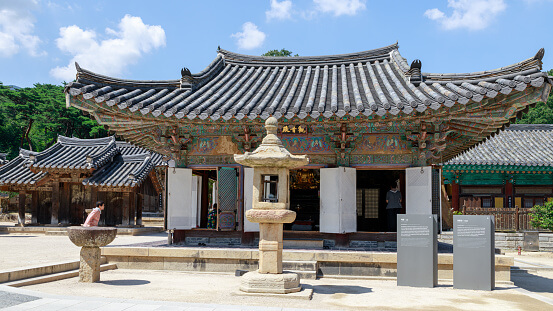
Tongdosa Temple is one of the five Korean temples of the “Nirvana Jewel Palace”, where the relics of Buddha replace a statue.
It is located on Yeongchuksan Mountain.
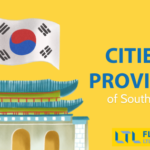
Korean Cities & Provinces // A Complete Guide
Got the taste to come to Korea and want to know where to go? Then this guide of Korean Cities and Provinces is just what the doctor ordered!
Lotus Lantern Festival
The highlight of Buddha’s Birthday is the Lotus Lantern Festival or 연등회 [Yeon Deung Hoe] in Korean.
It usually takes place on the weekend before Buddha’s Birthday. Koreans celebrate this event through a beautiful parade.
After the parade, thousands of wish lanterns are released into the sky. The festival ends with a parade to the front of the Jogyesa Temple in Seoul.
In 2020, the Lotus Lantern Festival was designated by UNESCO as intangible cultural heritage.
If you go to South Korea during this period, it is an event not to be missed!
Here is a video that shows the Jogyesa Temple during the Lotus Lantern Festival. It’s so beautiful and coloured:
When is Buddha’s Birthday in South Korea?
Buddha’s Birthday is celebrated on the eighth day of the fourth Lunar month of the Lunar Calendar.
Since the date of Buddha’s birthday celebration follows the Lunar Calendar, it changes every year.
| Years | Date | Day | Holiday |
|---|---|---|---|
| 2024 | May 15th | Wednesday | Buddha’s Birthday |
| 2025 | May 5th | Monday | Buddha’s Birthday |
| 2026 | May 24th | Sunday | Buddha’s Birthday |
It is also good to note that Buddha’s birthday is celebrated on different days depending on the country that celebrates it.
A Complete Vocabulary List
| English | Korean | Transliteration |
|---|---|---|
| Buddha’s Birthday | 석가탄신일 | seokga tansinil |
| Buddha | 석가 | seokga |
| Birthday | 생일 | saeng-il |
| Buddhism | 불교 | bulgyo |
| South Korea | 한국 | hanguk |
| Lunar Calendar | 음력 | eumlyeog |
| Public holiday | 공휴일 | gonghyuil |
| Temples | 향 | hyang |
| Lotus Lantern Festival | 연등회 | yeon deung hoe |
| Lantern | 연등 | yeondeung |
| Hanbok | 한복 | hanbok |
| Food | 음식 | eumsig |
| Bibimbap | 비빔밥 | bibimbap |
That completes our guide to the Buddha’s Birthday in South Korea.
Hopefully, this gives you a clearer idea of how people celebrate this important day.
Want to know more about Korean public holidays? How about checking out our introduction to public holidays in South Korea.
If you have attended this festival before, let us know about your experience in the comments!
Buddha’s Birthday in South Korea – FAQ’s
When is Buddha’s Birthday in 2024?
In 2024, Buddha’s Birthday in South Korea falls on May 15th 2024.
When is Buddha’s Birthday in 2025?
Buddha’s Birthday in South Korea falls on May 5th.
How do you say ‘Buddha’s Birthday’ in Korean?
Buddha’s Birthday in Korean is 석가탄신일 (seokgatansinil) sometimes Koreans also say 부처님 오신 날 (bucheonim osin nal).
What do Korean people do during Buddha’s Birthday?
Buddha’s Birthday is a public holiday (공휴일 gonghyuil), so Korean people have a day off to celebrate this day.
In Korea, most Buddha’s Birthday events are held in the week (sometimes the month) leading up to Buddha’s birthday, rather than on the day itself.
There are many things to do during Buddha’s Birthday, like visiting temples, eating free food and seeing the lotus lantern festival.
How do you say ‘Buddha’ in Korean?
The Korean word for Buddha is 석가 (seokga).
How many other holidays does Korea have?
Koreans celebrate or observe 13 other holidays, of which 4 (Valentine’s Day, Daeborum, Chilseok, and New Year’s Eve) are significant.
Want More From LTL?
FANCY LEARNING KOREAN? Check out our online Korean courses here.
We offer a 7-day free trial to all online students where you can study Korean 24/7.
Want to study Korean in Korea instead? Our Korean courses in Seoul can either be taken in small groups of no more than 5 students or individually for a more tailored experience.
We even offer incredible homestay experiences in Seoul too.
To top it all off, it certainly doesn’t end with Korean. Check out the other languages we teach 👇🏻








